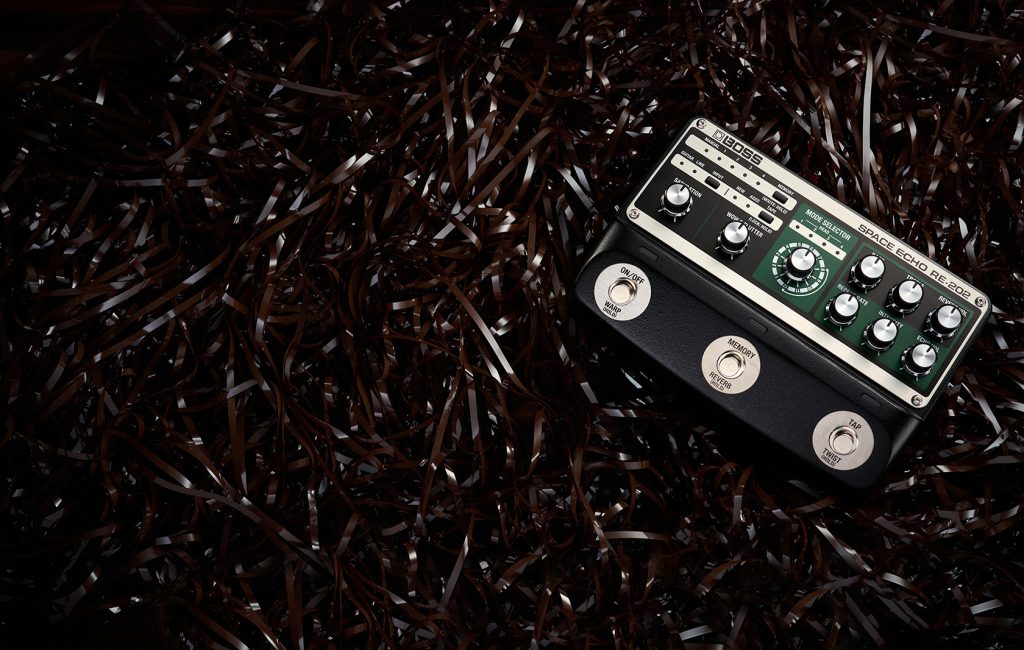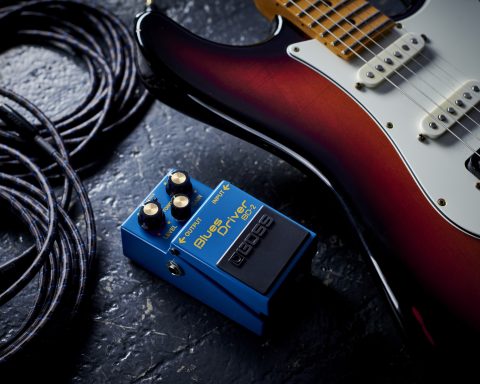Bristol’s Stew Jackson has a rich pedigree as both guitarist and studio wunderkind. For the last decade and a half, he’s maintained a tight partnership with Grantley Evan Marshall of Massive Attack. The pair co-write and produce for the acclaimed trip-hop collective and other projects. Jackson has also logged hours on the road with Detroit’s legendary mystery man Rodriguez as well as Marc Ford of the Black Crowes. The multi-talented producer dishes on his city’s musical mojo, the BOSS RE-202, and the natural power of delay.
Massive Partnership
For well over a decade, you’ve been working as part of Massive Attack. How would you define your role?
That’s a hard question to answer. I work with half of Massive Attack. Massive has always been a collaborative endeavor. So you’ve got Grant Marshall, and there’s Robert (Del Naja) or 3D. On a day-to-day basis, my role changes all the time. Sometimes I’m playing things, sometimes I’m writing, and sometimes I’m pushing blocks around on a screen. We’ve have been working together for 15 or 16 years to varying degrees of output.
"I've been lucky enough to work with some of the greatest songwriters. It does my head in, so I try not to think about it too much."
You’ve worked with many vocalists—everyone from Hope Sandoval and Damon Albarn. What have you learned from them?
I’ve been lucky enough to work with some of the greatest songwriters. It does my head in, so I try not to think about it too much. Grant and I put tracks together and send them to singers we really like. We show them what we’ve got and let them react however they feel.
Obviously, everyone’s completely different. Hope has a very unique way of looking at music. I’ll try and set things up, and Hope runs with the ball however she sees it, which is amazing. Damon is interesting to work with. He’s incredibly talented and works quickly.
How does the collaborative process work?
Largely, rather than sit down and try to write for a person, we write and let it dictate who’s going to sing on it or not. We try not to be too pointed with it, but we’ve definitely written stuff where we immediately go, “This would be great for this person.” And then nothing happens forever. I’ve got about 400 tunes on my hard drive parked.
BOSS RE-202
What is your experience with the BOSS RE-202 Space Echo pedal?
I was just screwdriver guitaring with the RE-202. Grant and I are putting together a version of “Paradise Circus” for a movie. We’re still unsure who the vocal is going to be from. This is going to be a reimagined version, which is weird because it feels like we’re doing a remix of a cover version of a song we wrote.
I normally don’t use the RE-202 as a guitar pedal. I’ve got it set next to my rack, plumbed into the Apollo on sends five and six, and been using it more as outboard gear.
"Tricky wanted us to do a remix for Lee Scratch Perry on a record he made just before he died for Tricky's label. The RE-202 is all over that."
Are there certain things you put through it, like vocals or put snares?
I put everything through it. This a very interesting bit of kit. Not just the delays—I’ve been having an awful lot of fun with the reverb. A little while ago, Tricky got in touch with us and wanted us to do a remix for Lee Scratch Perry on a record he made just before he died for Tricky’s label. The RE-202 is all over that.

Delay Reactions
What is it about the magic of delay that captivates music listeners?
Every guitar player knows if you want to make a guitar sound trippy, you put a delay on it. It’s instant psychedelia. Because delays very seldom occur in nature, they have a supernatural element. Delays help create a world you can submerge into. And I love slapback on vocals, even when it’s completely inappropriate. I remember listening to Time Out of Mind by Bob Dylan. The slap on his voice is so loud, and it’s perfect.
"Because delays very seldom occur in nature, they have a supernatural element. Delays help create a world you can submerge into."
Was dub music around a lot growing up?
If you live in Bristol, it’s hard to escape. What I love about dub is when they use really hard delays. Dub is a tiny bit scary. It’s kind of like they’re showing you the abyss. I remember being younger and enjoying that feeling of your feet not being able to touch the bottom anymore. As a sound, it’s exciting.
Inspirations and Icons
Who were some of your early musical influences?
My first love that wasn’t my dad’s music was hip-hop. Friends of the family used to give me hip-hop tapes. I was into electro and that kind of stuff. My brother’s always been the cultured one in the family. He played me Highway to Hell, and it did my skull in. He then turned me on to the Pixies, Mercury Rev, and bands like Captain America. My brother’s influence taught me to engage my brain and embrace the angles.
"Dub is a tiny bit scary. I remember being younger and enjoying that feeling of your feet not being able to touch the bottom anymore."
What guitarists and musicians inspire you?
Joey Santiago is right up there. One of the things I always loved about the Pixies was the ingredients are the same as every other band, but it didn’t sound like anything else. I also love the sax player Colin Stetson who puts a microphone on his throat so he can sing what he plays. He makes incredible noise and writes beautiful music.
Adrian Utley from Portishead is a phenomenal guitar player. He turned me onto the prepared guitar stuff. We never worked together until relatively recently, but I’ve always been a fan.
Tell us a little bit about your time with Rodriguez.
Our agent at the time knew he was looking for a pickup band friend, and my old band was a one-stop shop. He came over to rehearse before the tour, and we did four hours of rehearsal. And opening night was three sold-out shows at the Roundhouse. My first gig with him was doing Later… with Jools Holland. Just me and him.
"Bristol was always known for punk rock and post-punk. There's an inherent heaviness to music that comes from around here."
Sound of the City
What about Bristol made it a breeding ground for trip-hop and other styles?
This question has cropped up before. People have similar conversations about different types of music in Manchester, Liverpool, or London. There’s an inherent heaviness to music that comes from around here. I think Idles has done a great job. Bristol was always known for punk rock and post-punk. So that’s kind of done a full circle, you know?






